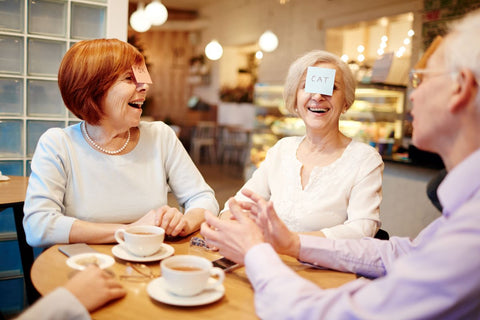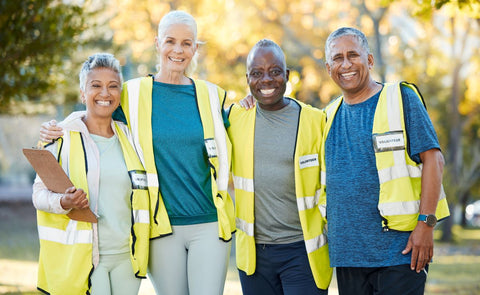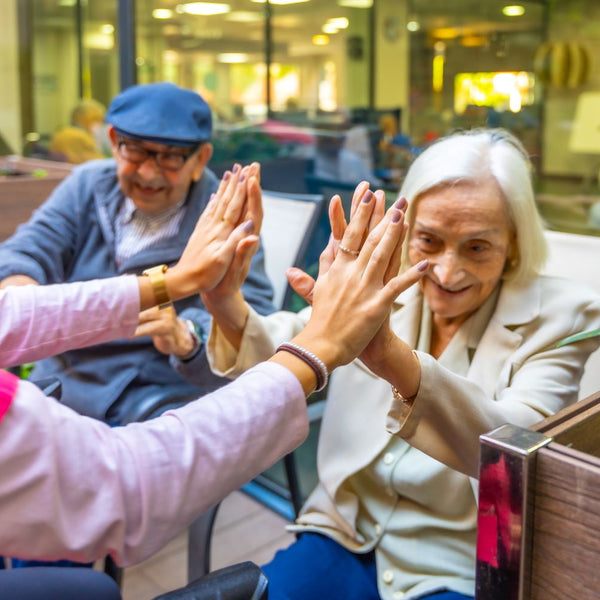As we age, social engagement becomes more important, especially for our mental health. However, many older adults experience social isolation and feel more lonely during their later years, which negatively impacts their quality of life. This might be due to various reasons, including retirement, mobility issues and health decline, financial changes, or losing a loved one.
The positive news is that there are plenty of fun social activities for the elderly that can help them connect with other people, stay active, and enjoy their later years. After retirement, older adults can rethink the hobbies and social activities they have always wanted to do but couldn't because of work or family commitments.
In this blog, we explore different social activities for the elderly to deal with circumstances in their later life.
Jump to:
If an older adult has experienced the loss of a loved one, volunteering with a meaningful cause can be beneficial. Alternatively, they can participate in group activities that provide a calm atmosphere and an opportunity to share their grief with others who have gone through similar experiences. However, taking time to heal before engaging in these activities is important.
Coffee clubs

Joining a coffee club is a great way to become part of a community and find new social activities. Organisations like Age UK manage cafe and lunch clubs for older adults, which allow you to meet old and new friends. They also run specific cafes for older adults with dementia. Local community centres and churches may also hold coffee mornings that you can join.
Cafes and restaurants can be relaxing and friendly places, helping you cope with loneliness and introducing you to new friends. Sometimes, these clubs might invite guest speakers to make the events more entertaining and engaging. Taking part in social activities during these events can help in boosting confidence, managing stress and making you feel generally happier and more engaged.
Book clubs
Reading is a great activity to improve cognitive decline in older adults. You can join a book club in your area or start one at home with your friends and family to discuss your favourite books and poems. You can be part of interesting conversations, learn new things, and build new connections in these book clubs.
Many genres, like travel, historical accounts, and autobiographies, can lead to thought-provoking discussions. If you love writing, you can write memoirs or short poems and share your work with your book club group, allowing you to express yourself.
You can look online to find a book club in your area or your local library may be able to help. Your library may also be able to suggest new books and genres for your club to explore.
Volunteering

Volunteering for a local organisation or cause close to your heart can be a great opportunity to engage with communities and feel part of a purpose. Joining a group of volunteers can help the elderly become part of a team and create new connections with people from different generations and walks of life outside their usual social circle. Volunteering does not have to be a big time commitment, making it ideal for those with active and busy lives.
Engaging with a community helps people gain confidence, deal with loneliness, and have a positive outlook on life. If you love writing, you can join PostPals, which allows people to write letters or send cards to children in hospitals.
If you find it hard to leave the house, you can join a telephone befriending service. You can choose to do it through a local charity or a national organisation like Age UK. These services connect a friendly volunteer with an elderly person for a weekly half-hour phone call, which helps fight social isolation and gives you a chance to become a part of a positive and pleasant conversation.
Exercise classes
Getting involved in at least two hours of weekly moderate-intensity exercises, like aerobics, is beneficial for the elderly. It helps to improve their strength, balance and flexibility. Moreover, older adults are often recommended to exercise regularly to help them manage medical conditions such as blood pressure concerns, heart disease, diabetes, and osteoporosis.
However, some older adults might find it difficult to exercise alone. For such times, older adults can join group classes of their favourite sports specifically tailored for the elderly. These classes are ideal to find the motivation and support to stay active. They also provide a good opportunity to be part of a fun environment that allows you to make social connections.
If you have mobility issues and find it challenging to engage in high-intensity workouts, you can find walking groups or communities in your area. You can also start practising gentle exercises at home with your partner and friends, allowing you to connect with them weekly. You can join mindfulness or yoga groups if you are looking for social activities that help you calm down and improve your mental wellbeing.
You can create realistic weekly or monthly fitness goals and track them with a fitness tracker. Achieving fitness goals also provides a sense of accomplishment and increases self-confidence.
Game nights

Organising a game night with friends and family or your social group can be intellectually stimulating for older adults. Playing board games or solving puzzles brings good-natured competition, and it isn't physically demanding. Puzzles come in many forms, from crosswords and sudoku to jigsaws. You can play these games the old-fashioned way, or if you want to go digital, there are plenty of phone apps that you can download to track and share your progress.
Sit-down brain games are perfect for older adults with mobility issues or those who prefer seated activities. Card games or playing bingo offers mental stimulation, entertainment, and social interaction, all while comfortably seated.
Peace of mind while engaging in fun social activities
Getting a personal alarm can provide peace of mind to you and your loved ones while you are out and about with your social group or when organising game nights in your home or garden.
At TakingCare, we have various personal alarms with multiple features and functions so that you can choose the one most suited to your circumstances.
- A personal fall alarm will automatically detect if you have a fall in the home or garden and raise an alert.
- A GPS personal alarm is convenient if they spend lots of time out and about - it works anywhere and can give the resolution team your GPS location if needed.
- If you stay active and want to track your steps, you can choose the stylish personal alarm watch that acts as a 24/7 monitored alarm as well.
- A monitored personal alarm means there is always someone to contact, day or night if your loved one needs help or reassurance.
Have a look at the full range of TakingCare personal alarms.
You or your loved one don't have to endure the burden of feeling socially isolated alone. There is support available to help you or your loved one cope with the negative effects of social isolation.
Recognising the signs of loneliness
If you or a loved one is affected by loneliness, our Staying Connected guide will help you understand the symptoms and address the causes. The guide provides information, resources and advice to help you overcome loneliness, build meaningful connections and be your best in later life.



